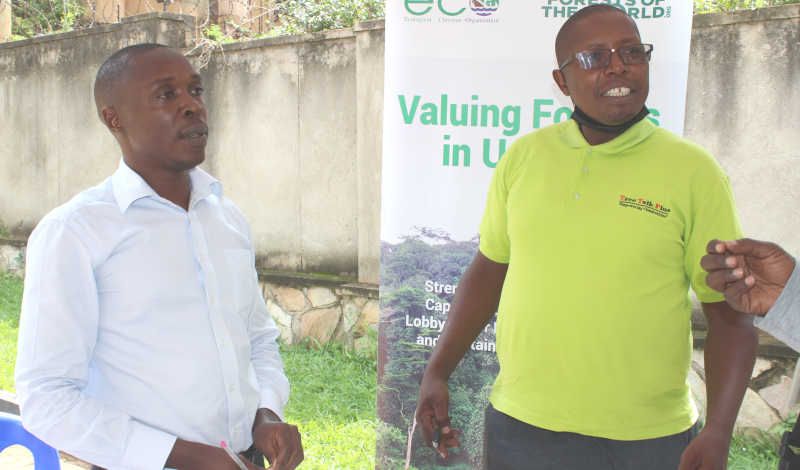

Ecological Christian Organization (ECO) offices, the Organization’s Programs Officer Anthony Wolimbwa and Colleague Gaster Kiyingi
Conservationists under the Civil Society Forest Working Group have asked the government to offer incentives to private foresters as opposed to maintaining the current system that only penalizes those who harvest wood products from private forests.
This comes at a time the sector is undertaking a review of the National Forestry Policy, a process critics say has been delayed for over 20 years.
In a media engagement held at the Ecological Christian Organization (ECO) offices, the Organization’s Programs Officer Anthony Wolimbwa said that the group is seeking to make changes in the policy to address the dwindling status of Uganda’s forest resources.
If Incentives from government for private foresters are incorporated in policies, plan and laws this will reduce deforestation on private forest estate.
“The people managing these schemes have not been paying smallholder farmers adequately which can only be addressed by a policy and laws
“The government needs to ensure that carbon trade schemes benefit and do not exploit private forest owners. Currently the carbon trade is not fair especially for smallholder farmers at the community level. The policy should ensure that more people with private forests, tree plantations are enrolled into the carbon trade schemes.”
Besides creating a more equitable arrangement for private foresters, Wolimbwa argues that the current licensing regime for private foresters is defective. He has called for incentives for individuals and companies to invest in tree planting and maintenance.
“The licenses – issued to private forest owners at harvest time – should have an element of incentives in the form of tax waivers. Those who plant more trees when they harvest timber, on those keep their estates intact.
“Incentives still in form of tax waivers should go to big companies e.g Mukwano, Hima cement that may prove to have planted more trees and contributed to conservation efforts.
Expressing concern over the high rate of deforestation in the country, Wolimbwa said fighting deforestation requires a carrot and stick approach.
“We have lost a significant chunk of the forest estate. We have lost over 35% of the natural forest cover over a period of just 10 years and we have been losing forest cover at almost 1.5% per annum. So if we are remaining with 740,000 hectares in Uganda, the loss is quite high and alarming. We must reverse this dangerous trend if we want to save this country.”
It is estimated that Uganda loses between 60,000 to 120,000 hectares of forest cover per year. If current trends are maintained,experts worry that the country will be left with no forest cover by the year 2050.
Of the 1.9 million hectares of permanent forest estate we have lost about 35% especially for the forest estates managed by the National Forestry Authority, District Forest services. Those under the Uganda Wildlife Authority which is still intact.
Wolimbwa says this presents a challenge for the forests on Private land, forests managed by the National Forestry Authority and the Districts.
“So we need to address this degradation, why is it happening in these other forest estates and why not in the forest managed by the Uganda Wildlife Authority?”Wolimbwa wonders.
Gaster Kiyingi, a member of the Forestry working group said because of the challenges facing the sector including corruption, insufficient finances for the comprehensive consultation process, the anticipated effects of COVID19 on the quality of the consultations, the group is working on innovative approaches to help the review process.
Presenting a catalogue of proposals for policy reforms, Kiyingi who is also from Tree Talk, a member organization of the Forestry working group said Climate Change especially the Green-House-Gas (GHG) emission from deforestation and forest degradation must be considered regarding the 2001 National Forestry policy review.














Solomon Lubambula
Leave a Comment
Your email address will not be published.